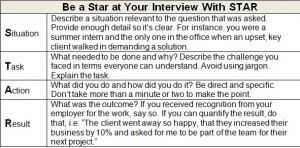Panel interviews are often used for executive positions, as well as positions in academia and government. This is a very dynamic and effective technique for organizations to evaluate a candidate as a group. It gives key leaders a chance to provide feedback regarding the candidate’s ability to fit in with the management team and helps to measure potential success.
Here are a few tips to share with your candidate so they’ll shine at a panel interview. Done properly and with confidence, your candidate can leave the competition in the dust as they move forward to the next phase in the process!
The Panel
When you receive an invitation for an interview, find out if it will be a panel interview and who will be on the panel. In most instances, your recruiter will already have this information and may even provide you with some background on each of the participants. However, sometimes employers can’t or choose not to share that information. Be sure to ask, but if that’s the case, don’t press. In most cases you will be told the key figures on the panel or at least their job titles. Use this information to research the panelists.
Who Are You?
Some panelists will have questions prepared. Others are thinking, “Who are you and why did you pull me away from my office?” In many cases, a panel interview will begin with a request for you to present a summary of your experience, your goals, and what value you offer the company. This should be a brief elevator speech – meaning keep it under 60 seconds.
From All Angles
 In a panel interview, there may be managers from various departments, and each will ask questions from his or her unique perspective. For example, the IT director may want to hear about examples of how you interacted with IT on major systems or development requests. In other words, were you reasonable with your requests? Be prepared to share brief examples of how you interacted with various department heads. A good model when telling a story from your experience is the Situation, Task, Action and Response/Achievement (STAR) model. Past experience is the best indicator of your future success.
In a panel interview, there may be managers from various departments, and each will ask questions from his or her unique perspective. For example, the IT director may want to hear about examples of how you interacted with IT on major systems or development requests. In other words, were you reasonable with your requests? Be prepared to share brief examples of how you interacted with various department heads. A good model when telling a story from your experience is the Situation, Task, Action and Response/Achievement (STAR) model. Past experience is the best indicator of your future success.
Barrage of Questions
You may feel as though you are under fire. Relax; take one question at a time. Take a breath between each question to make sure you are composed. Eye contact is important. Give your attention to each person as they ask a question. As you answer questions make eye contact with each panelist. You may experience a bit of “good cop, bad cop” interviewing as two panelist work in tandem to test you on how you would tackle a particular issue. Try not to vacillate. Answer honestly and directly. Remember, they want a leader who is decisive and can commit to a straight answer.
Ask Smart Questions
Prepare a question to ask each panelist at the end of the interview. If you do not know the panelists in advance, have brief notes in your folio to allow you to formulate questions on the fly.
Connecting with Each Panelist After
If you did not get each person’s business card at the beginning of the interview, be sure to jot down each person’s name, their job title and area of responsibility. Make brief notes as to what each person asked. Perhaps you can just write two to three words next to each name to help you recall this later. You will use this information so you can send a personal thank you letter or email to each panelist after the interview. In your letter, reiterate why you are an excellent fit from the perspective of each panelist.
Image courtesy Michal Marcol / FreeDigitalPhotos.net
